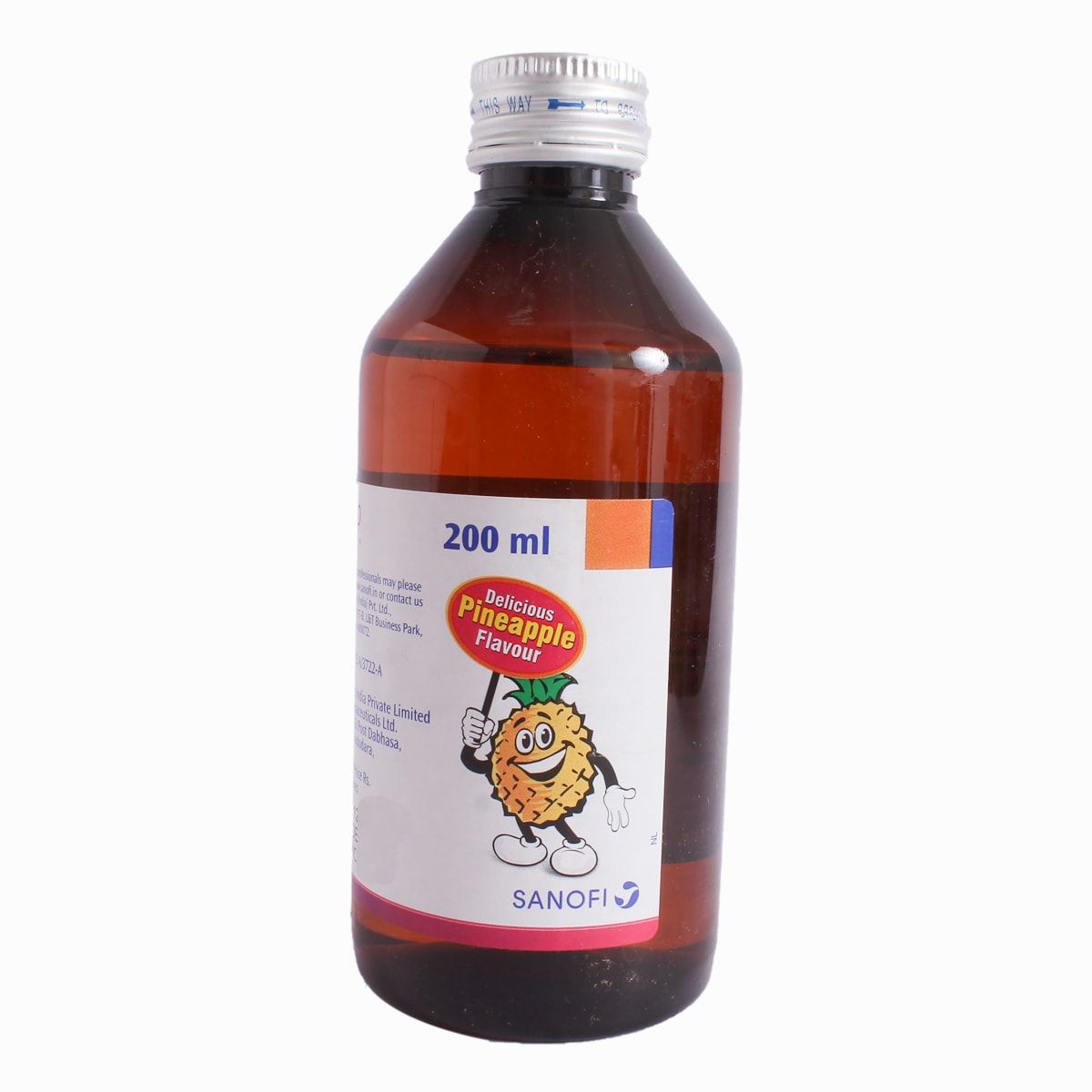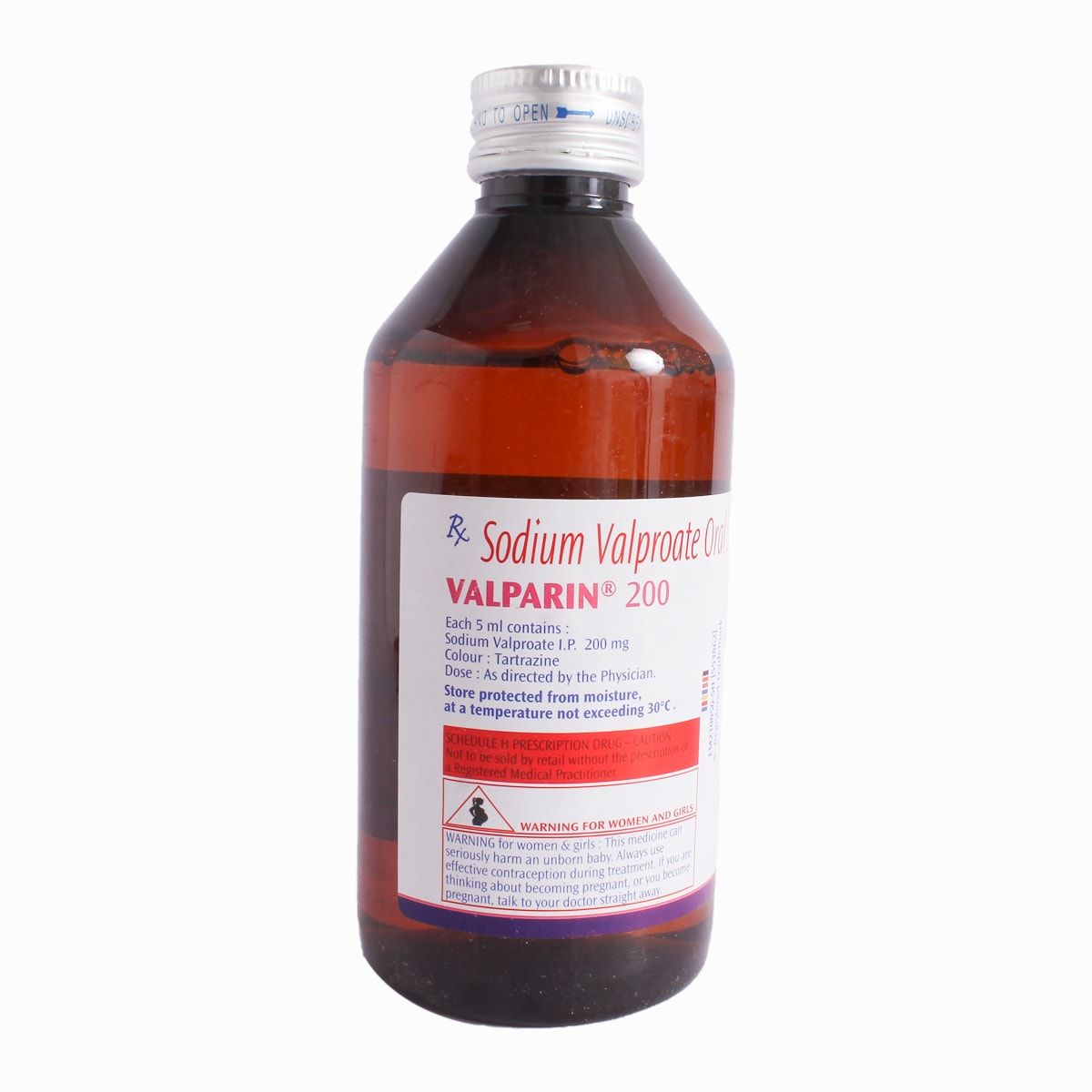वैलपरिन ओरल सॉल्यूशन 200 मिली


₹131*
MRP ₹145.5
10% off
₹123.67*
MRP ₹145.5
15% CB
₹21.83 cashback(15%)
Free Delivery
With Circle membership
(Inclusive of all Taxes)
This offer price is valid on orders above ₹800. Apply coupon PHARMA10/PHARMA18 (excluding restricted items)
Valparin Oral Solution is used to treat epilepsy/seizures/fits. Additionally, it is also used to treat bipolar disorder and prevent symptoms of migraine (like a headache). It contains Sodium valproate, which decreases the excessive and abnormal nerve activity in the brain. Thereby, helps in controlling seizures. It helps block the nerve transmission across the brain and provides a calming effect. In some cases, you may experience certain common side effects, such as stomach pain, nausea, vomiting, changes in appetite, weight changes, and diarrhoea. Before taking this medicine, you should tell your doctor if you are allergic to any of its components or if you are pregnant/breastfeeding, and about all the medications you are taking and pre-existing medical conditions.
Know Your Delivery Time
Provide Delivery Location
 Prescription drug
Prescription drugWhats That

Secure Payment

India's Most Trusted Pharmacy

Genuine Products
- Inform your doctor about the nausea and discuss possible alternatives to the medication or adjustments to the dosage.
- Divide your daily food intake into smaller, more frequent meals to reduce nausea.
- Opt for bland, easily digestible foods like crackers, toast, plain rice, bananas, and applesauce.
- Avoid certain foods that can trigger nausea, such as fatty, greasy, spicy, and smelly foods.
- Drink plenty of fluids, such as water, clear broth, or electrolyte-rich beverages like coconut water or sports drinks.
- Use ginger (tea, ale, or candies) to help relieve nausea.
- Get adequate rest and also avoid strenuous activities that can worsen nausea.
- Talk to your doctor about taking anti-nausea medication if your nausea is severe.
- Record when your nausea occurs, what triggers it, and what provides relief to help you identify patterns and manage your symptoms more effectively.
- Consume controlled amounts of salt to raise sodium levels.
- Eat fresh fruits like apples, berries, oranges, mangoes, and bananas.
- Include fresh vegetables like broccoli, sweet potatoes, beets, okra, spinach, peppers, carrots, and edamame.
- Choose frozen vegetables without added butter or sauce.
- Drink electrolyte beverages like sports drinks or electrolyte solutions to replenish sodium and other electrolytes.
- Avoid excessive salt intake, but allow for controlled increases as needed.
- Monitor and manage underlying health conditions that may contribute to hyponatremia.
- Preventing Vomiting (Before it Happens)
- Take medication exactly as prescribed by your doctor. This can help minimize side effects, including vomiting.
- Having a small meal before taking your medication can help reduce nausea and vomiting.
- Talk to your doctor about taking anti-nausea medication along with your prescribed medication.
- Managing Vomiting (If it Happens)
- Try taking ginger in the form of tea, ale, or candy to help alleviate nausea and vomiting.
- What to Do if Vomiting Persists
- Consult your doctor if vomiting continues or worsens, consult the doctor for guidance on adjusting your medication or additional treatment.
- Brush and floss regularly twice a day with fluoride toothpaste and once a day with floss.
- Use a soft or extra-soft toothbrush.
- Avoid tobacco products, as smoking can worsen gum problems.
- Use an antimicrobial mouthwash to reduce bacteria and prevent bleeding.
- Drink green tea rich in catechin to reduce inflammation from oral bacteria.
- Eat a balanced diet high in nutrients and low in sugar.
- Reduce stress to minimize inflammation and gum bleeding.
- Consult your dentist if gums bleed consistently.
- Inform Your Doctor: Notify your doctor immediately about your diarrhoea symptoms. This allows them to adjust your medication or provide guidance on managing side effects.
- Stay Hydrated: Drink plenty of fluids to replace lost water and electrolytes. Choose water, clear broth, and electrolyte-rich drinks. Avoid carbonated or caffeinated beverages to effectively rehydrate your body.
- Follow a Bland Diet: Eat easy-to-digest foods to help firm up your stool and settle your stomach. Try incorporating bananas, rice, applesauce, toast, plain crackers, and boiled vegetables into your diet.
- Avoid Trigger Foods: Steer clear of foods that can worsen diarrhoea, such as spicy, fatty, or greasy foods, high-fibre foods, and dairy products (especially if you're lactose intolerant).
- Practice Good Hygiene: Maintain good hygiene to prevent the spread of infection. To stay healthy, wash your hands frequently, clean and disinfect surfaces regularly, and avoid exchanging personal belongings with others.
- Take Anti-Diarrheal Medications: If your doctor advises, anti-diarrheal medications such as loperamide might help manage diarrhoea symptoms. Always follow your doctor's directions.
- Keep track of your diarrhoea symptoms. If they don't get better or worse or are accompanied by severe stomach pain, blood, or dehydration signs (like extreme thirst or dark urine), seek medical help.
- Notify your doctor immediately if you experience tremors or involuntary shaking after taking medication or adjusting your medication regimen.
- Your doctor may adjust your medication regimen or recommend alternative techniques like relaxation, meditation, or journaling to alleviate tremor symptoms.
- Your doctor may direct you to practice stress-reducing techniques, such as deep breathing exercises, yoga, or journaling.
- Regular physical activity, such as walking or jogging, can help reduce anxiety and alleviate tremor symptoms.
- Your doctor may recommend lifestyle changes, such as avoiding caffeine, getting enough sleep, and staying hydrated, to help manage tremors.
- Maintain regular follow-up appointments with your doctor to monitor tremor symptoms and adjust treatment plans as needed.
Drug-Drug Interactions
Drug-Drug Interactions
Login/Sign Up
Combining Sodium phenylbutyrate and Valparin Oral Solution 200 ml can increase ammonia levels in the blood.
How to manage the interaction:
Taking Sodium phenylbutyrate with Valparin Oral Solution 200 ml is not recommended, but it can be taken if prescribed by a doctor. If you experience any symptoms like sudden dizziness, lightheadedness, fainting, headache, shortness of breath, nausea, vomiting, chest pain or tightness, rapid heartbeat, or memory loss, contact your doctor immediately. Do not discontinue any medications without consulting a doctor.
Co-administration of Valparin Oral Solution 200 ml with doripenem can reduce the blood levels of valproic acid.
How to manage the interaction:
Co-administration of Doripenam and Valparin Oral Solution 200 ml can lead to an interaction, it can be taken if advised by your doctor. However, if you experience sudden dizziness, lightheadedness, fainting, shortness of breath, chest pain or tightness, rapid heartbeat, involuntary muscle movements, or memory loss, contact your doctor immediately. Do not discontinue any medications without consulting a doctor.
Co-administration of Ketamine and Valparin Oral Solution 200 ml can increase side effects and cause respiratory depression.
How to manage the interaction:
Co-administration of Ketamine and Valparin Oral Solution 200 ml can lead to an interaction, but it can be taken if your doctor advises. However, consult your doctor immediately if you experience any symptoms like dizziness, drowsiness, confusion, difficulty concentrating, excessive sedation, impaired thinking, judgment, and motor coordination. Avoid driving or operating hazardous machinery until you know how these medications affect you. Do not discontinue any medications without consulting the doctor.
Co-administration of Lithium with Valparin Oral Solution 200 ml can increase the risk irregular heart rhythm.
How to manage the interaction:
Co-administration of Lithium and Valparin Oral Solution 200 ml can lead to an interaction, but it can be taken if advised by your doctor. However, consult your doctor immediately if you experience any symptoms like dizziness, drowsiness, confusion, lightheadedness, fainting, shortness of breath, chest pain or tightness, rapid heartbeat, and difficulty concentrating. Do not discontinue any medications without consulting a doctor.
Co-administration of Meropenam and Valparin Oral Solution 200 ml together can reduce the effect of Valparin Oral Solution 200 ml.
How to manage the interaction:
Co-administration of Meropenam and Valparin Oral Solution 200 ml can lead to an interaction, but it can be taken if your doctor advises. However, if you experience any unusual symptoms, consult a doctor immediately. Do not discontinue any medications without consulting a doctor.
Using buprenorphine together with Valparin Oral Solution 200 ml may increase the risk of severe side effects, including respiratory problems and loss of consciousness.
How to manage the interaction:
Although the administration of buprenorphine alongside Valparin Oral Solution 200 ml can result in an interaction, it can be taken if a doctor has advised it. However, if you experience sudden dizziness, lightheadedness, fainting, shortness of breath, chest pain or tightness, rapid heartbeat, or memory loss, contact a doctor immediately. Do not discontinue any medications without consulting a doctor.
Co-administration of Teriflunomide and Valparin Oral Solution 200 ml can increase the risk of causing liver problems.
How to manage the interaction:
Co-administration of Teriflunomide and Valparin Oral Solution 200 ml can lead to an interaction, it can be taken if advised by your doctor. However, if you experience any symptoms like fever, chills, joint pain or swelling, unusual bleeding or bruising, skin rash, itching, loss of appetite, fatigue, nausea, vomiting, abdominal pain, dark-colored urine, light-colored stools, and yellowing of the skin or eyes. Avoid alcohol while taking these medications, and consult your doctor immediately. Do not discontinue any medications without consulting your doctor.
The combined use of Ertapenem and Valparin Oral Solution 200 ml can reduce the blood levels of valproic acid.
How to manage the interaction:
Co-administration of Ertapenem and Valparin Oral Solution 200 ml can lead to an interaction, it can be taken if advised by your doctor. However, if you experience any symptoms like loss of seizure control or changes in behavior, consult your doctor immediately. Do not discontinue any medications without consulting the doctor.
Co-administration of Leflunomide and Valparin Oral Solution 200 ml can increase the risk of causing liver problems.
How to manage the interaction:
Co-administration of Leflunomide and Valparin Oral Solution 200 ml can lead to an interaction, they can be taken together if prescribed by a doctor. However, if you experience fever, chills, joint pain or swelling, unusual bleeding or bruising, skin rash, itching, less desire to eat, fatigue, nausea, vomiting, abdominal pain, or yellowing of the skin or eyes, contact a doctor immediately. Do not discontinue any medications without consulting a doctor.
Co-administration of Vorinostat with Valparin Oral Solution 200 ml can increase the risk of unusual bleeding.
How to manage the interaction:
Co-administration of Vorinostat and Valparin Oral Solution 200 ml can lead to an interaction, it can be taken if advised by your doctor. However, if you experience any symptoms like unusual bleeding or bruising, vomiting, blood in your urine or stools, headache, dizziness, or weakness, consult your doctor immediately. Do not discontinue any medications without consulting your doctor.
Drug-Food Interactions
Drug-Food Interactions
Login/Sign Up
Product Substitutes

Have a query?
FAQs
Disclaimer
Author Details
We provide you with authentic, trustworthy and relevant information















